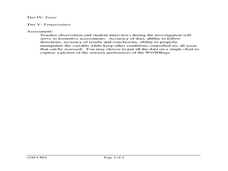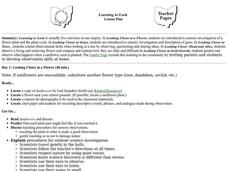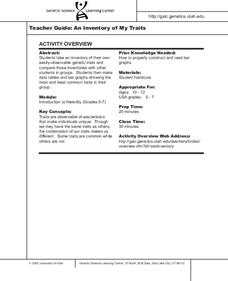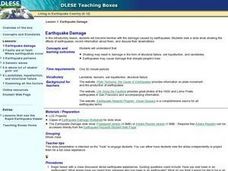Curated OER
Cloud and Weather Patterns
Fourth graders examine how weather patterns generally move from west to east across the United States, and how clouds are formed and are related to the water cycle. They view and discuss a PowerPoint presentation of the types of clouds,...
Curated OER
The Nature of Science and Technology
Second graders perform a variety of experiments to observe, form conclusions, and make inferences. For this experiment lesson, 2nd graders experiment based on the result of a pre-assessment. Students share what they have learned.
Curated OER
A Guinea Pig Makes An Excellent Classroom Pet
Third graders live alongside guinea pigs. In this biology lesson plan, 3rd graders gain direct knowledge of the guinea pig's behavior and determine if it will make a good classroom pet.
Curated OER
Learning To Look
Sixth graders investigate a flower plant and the plant cycle. They extend observational skills when looking at a tree by observing, questioning and sharing ideas. They observe a living and nonliving flower and compare and contrast how...
Curated OER
The Life Cycle of the Butterfly
First graders, after listening to fictional and non-fictional literature about caterpillars, and observing caterpillars from egg to butterfly, write a "biography" of a caterpillar using appropriate vocabulary and time lines.
Curated OER
F = a, Inertia, and Friction
Fourth graders use a matchbox car to push across a hard surface and observe what happens. They then push the car across a soft or rough surface and discover what happens. The two ideas are discusses as Newton's First and Second Laws of...
Curated OER
How Can We Make a Model of Lungs?
Fifth graders examine the function of the lungs and create a model of the lungs. Using a plastic cup, drinking straw, plastic bag, small balloon, and a rubber band, they follow step-by-step directions to construct simulated lungs. ...
Curated OER
Government
Second graders run for various offices. They dress up like a politician, pretend to be running for an office, and tell the students why they should vote for him/her. They explain why it is necessary for a community to have a government
Curated OER
Sunny Science - Sun Up, Fade Out
Learners create bleached designs with the sun's bright light. In this early childhood science lesson, students use their observation and prediction skills as they explore the sun's bleaching power.
Curated OER
Bubbles
Students observe the characteristics of bubbles. In this scientific inquiry lesson, students use a bubble solution and a wand to make bubbles and observe their characteristics. Students identify the shape and the color of the bubbles.
Curated OER
Dynamic Earth
Students show how earthquakes affect sea waves. In this tidal waves lesson students use a rubber mallet on a table to create waves in a box on top of the table. They experiment with striking the mallet in different locations on the...
Curated OER
An Inventory of My Traits
Students take an inventory of their own easily-observable genetic traits and
compare those inventories with other students in groups. They then make
data tables and bar graphs showing the most and least common traits in their group.
Curated OER
An Inventory of My Traits
In this biology activity, students identify and describe a number of easily observable genetic traits and compare the traits they have with other students. Then they identify and describe that some traits are common while others are not...
Curated OER
Get to Know Birds
Students observe animals in their natural habitats. In this bird identification lesson, students observe birds by watching and listening and report on the sightings they made. Students also document bird signs such as tracks, nests and...
Curated OER
Jungle Gym Drop
Students investigate gravity, force and motion. In this motion of objects lesson, students drop various objects from a jungle gym and collect, measure and observe their data. Students describe the forces that affect the motion of their...
Curated OER
Senses of Taste and Smell
Students perform experiments to learn about their sense of taste and smell. In this taste and smell lesson, students watch as a blindfolded student tries to identify sounds and the direction they originate from. Students observe a...
Curated OER
Mapmaking
Students examine the craft of cartography and how the Lewis and Clark expedition created and used maps. They analyze maps, read a handout, create a map, participate in a mini expedition and map out a route based on travel directions,...
Curated OER
Movement Across the Membrane (Diffusion)
Students investigate the concept of diffusion and how materials enter and leave a cell. In this movement across a membrane lesson plan, students use perfume, food coloring in water and a sugar cube in water to observe diffusion. They...
Curated OER
Ups and Downs of Diving
Students explore the science and sport of scuba diving. In this scuba diving lesson, students build Cartesian divers and observe their behavior under water pressure.
Curated OER
Treasure Hunt
First graders read and follow a map in a treasure hunt to find the location of the treasure. They demonstrate their knowledge/understanding of symbols, keys on a map, and directions by following the map with ease.
Curated OER
Bridging the Gaps Between the Three Worlds of Chemistry
Students examine the observed world, molecular world, and the symbolic world of chemistry. They observe a demonstration of the conductivity of solutions, describe the properties of acids and bases, and predict the outcome of solution...
Curated OER
Chemical Fun
Fifth graders observe and conduct a variety of experiments to differentiate between physical and chemical changes. They mix cabbage juice with different liquids and record their observations on a chart. Students write down their...
Curated OER
Water Cycle in a Box
Fourth graders investigate how the water cycle is vital for all living things to survive on Earth. They observe the teacher set up a simulation of the water cycle using a Plastic Earth Simulator, desk lamp, and water, and make...
Curated OER
Earthquake Damage
Students identify that shaking may result in damage in the form of structural failure, soil liquefaction, and landslides. They also identify that earthquakes can cause damage that disrupts people's lives. Finally, students view a...

























